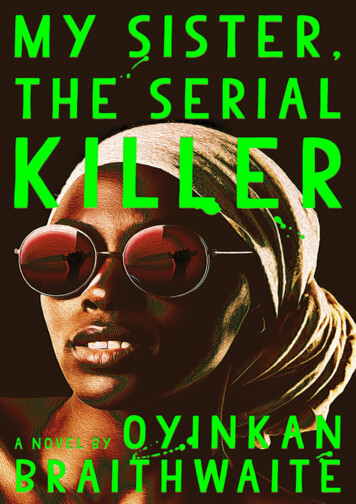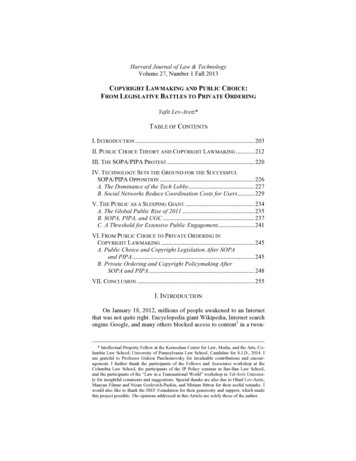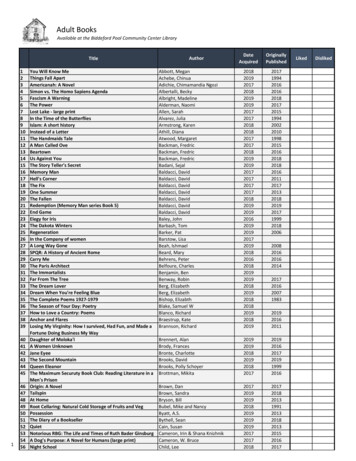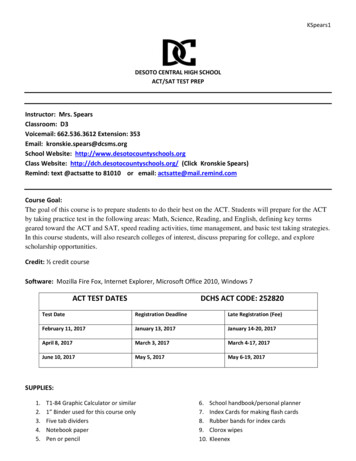
Transcription
This is a work of fiction. Names, characters, places, and incidents either are the product of the author’simagination or are used fictitiously. Any resemblance to actual persons, living or dead, events, or locales isentirely coincidental.Copyright 2017, 2018 by Oyinkan BraithwaiteAll rights reserved. Published in the United States by Doubleday, a division of Penguin Random HouseLLC, New York, and distributed in Canada by Random House of Canada, a division of Penguin RandomHouse Canada Limited, Toronto. Originally published in Nigeria, in different form, as an ebook entitledThicker Than Water by Qamina, Lagos, in 2017.www.doubleday.comDOUBLEDAY and the portrayal of an anchor with a dolphin are registered trademarks of PenguinRandom House LLC.Cover images: woman PeopleImages/DigitalVision/Getty Images; knife Westend61/Brand XPictures/Getty ImagesCover design by Michael J. WindsorLIBRARY OF CONGRESS CATALOGING-IN-PUBLICATION DATANames: Braithwaite, Oyinkan, author.Title: My sister, the serial killer : a novel / Oyinkan Braithwaite.Description: First edition. New York : Doubleday, [2018]Identifiers: LCCN 2018013372 ISBN 9780385544238 (hardback) ISBN 9780385544245 (ebook)Subjects: BISAC: FICTION / Contemporary Women. FICTION / Family Life. FICTION / Satire.Classification: LCC PR9387.9.B73 M9 2018 DDC 823/.92—dc23 LC record available athttps://lccn.loc.gov/2018013372Ebook ISBN 9780385544245v5.4ep
ContentsCoverTitle PageCopyrightDedicationWordsBleachThe NotebookThe PoemBodyScrubsThe nifeÈfó#3SongRedSchoolStainHomeBreak
e erResearchCarHeartThe PatientAngel of DeathBirthBirthdayHead NurseComaThe GameSeventeenManeater
AwakeMarketMemoryMadnessAsleepIce rokenPhone#2: 5AcknowledgmentsAbout the Author
For my family, whom I love very much:Akin, Tokunbo, Obafunke, Siji, Ore
WORDSAyoola summons me with these words—Korede, I killed him.I had hoped I would never hear those words again.
BLEACHI bet you didn’t know that bleach masks the smell of blood. Most people usebleach indiscriminately, assuming it is a catchall product, never taking the timeto read the list of ingredients on the back, never taking the time to return to therecently wiped surface to take a closer look. Bleach will disinfect, but it’s notgreat for cleaning residue, so I use it only after I have first scrubbed thebathroom of all traces of life, and death.It is clear that the room we are in has been remodeled recently. It has thatnever-been-used look, especially now that I’ve spent close to three hourscleaning up. The hardest part was getting to the blood that had seeped inbetween the shower and the caulking. It’s an easy part to forget.There’s nothing placed on any of the surfaces; his shower gel, toothbrush andtoothpaste are all stored in the cabinet above the sink. Then there’s the showermat—a black smiley face on a yellow rectangle in an otherwise white room.Ayoola is perched on the toilet seat, her knees raised and her arms wrappedaround them. The blood on her dress has dried and there is no risk that it willdrip on the white, now glossy floors. Her dreadlocks are piled atop her head, sothey don’t sweep the ground. She keeps looking up at me with her big browneyes, afraid that I am angry, that I will soon get off my hands and knees tolecture her.I am not angry. If I am anything, I am tired. The sweat from my brow dripsonto the floor and I use the blue sponge to wipe it away.I was about to eat when she called me. I had laid everything out on the tray inpreparation—the fork was to the left of the plate, the knife to the right. I foldedthe napkin into the shape of a crown and placed it at the center of the plate. Themovie was paused at the beginning credits and the oven timer had just rung,when my phone began to vibrate violently on my table.By the time I get home, the food will be cold.I stand up and rinse the gloves in the sink, but I don’t remove them. Ayoola islooking at my reflection in the mirror.“We need to move the body,” I tell her.“Are you angry at me?”
Perhaps a normal person would be angry, but what I feel now is a pressingneed to dispose of the body. When I got here, we carried him to the boot of mycar, so that I was free to scrub and mop without having to countenance his coldstare.“Get your bag,” I reply.We return to the car and he is still in the boot, waiting for us.The third mainland bridge gets little to no traffic at this time of night, andsince there are no lamplights, it’s almost pitch-black, but if you look beyond thebridge you can see the lights of the city. We take him to where we took the lastone—over the bridge and into the water. At least he won’t be lonely.Some of the blood has seeped into the lining of the boot. Ayoola offers toclean it, out of guilt, but I take my homemade mixture of one spoon ofammonia to two cups of water from her and pour it over the stain. I don’t knowwhether or not they have the tech for a thorough crime scene investigation inLagos, but Ayoola could never clean up as efficiently as I can.
THE NOTEBOOK“Who was he?”“Femi.”I scribble the name down. We are in my bedroom. Ayoola is sitting crosslegged on my sofa, her head resting on the back of the cushion. While she tooka bath, I set the dress she had been wearing on fire. Now she wears a rosecolored T-shirt and smells of baby powder.“And his surname?”She frowns, pressing her lips together, and then she shakes her head, asthough trying to shake the name back into the forefront of her brain. It doesn’tcome. She shrugs. I should have taken his wallet.I close the notebook. It is small, smaller than the palm of my hand. I watcheda TEDx video once where the man said that carrying around a notebook andpenning one happy moment each day had changed his life. That is why I boughtthe notebook. On the first page, I wrote, I saw a white owl through my bedroomwindow. The notebook has been mostly empty since.“It’s not my fault, you know.” But I don’t know. I don’t know what she isreferring to. Does she mean the inability to recall his surname? Or his death?“Tell me what happened.”
THE POEMFemi wrote her a poem.(She can remember the poem, but she cannot remember his last name.)I dare you to find a flawin her beauty;or to bring forth a womanwho can stand besideher without wilting.And he gave it to her written on a piece of paper, folded twice, reminiscentof our secondary school days, when kids would pass love notes to one anotherin the back row of classrooms. She was moved by all this (but then Ayoola isalways moved by the worship of her merits) and so she agreed to be his woman.On their one-month anniversary, she stabbed him in the bathroom of hisapartment. She didn’t mean to, of course. He was angry, screaming at her, hisonion-stained breath hot against her face.(But why was she carrying the knife?)The knife was for her protection. You never knew with men, they wantedwhat they wanted when they wanted it. She didn’t mean to kill him; she wantedto warn him off, but he wasn’t scared of her weapon. He was over six feet talland she must have looked like a doll to him, with her small frame, longeyelashes and rosy, full lips.(Her description, not mine.)She killed him on the first strike, a jab straight to the heart. But then shestabbed him twice more to be sure. He sank to the floor. She could hear herown breathing and nothing else.
BODYHave you heard this one before? Two girls walk into a room. The room is in aflat. The flat is on the third floor. In the room is the dead body of an adult male.How do they get the body to the ground floor without being seen?First, they gather supplies.“How many bedsheets do we need?”“How many does he have?” Ayoola ran out of the bathroom and returnedarmed with the information that there were five sheets in his laundry cupboard.I bit my lip. We needed a lot, but I was afraid his family might notice if the onlysheet he had was the one laid on his bed. For the average male, this wouldn’t beall that peculiar—but this man was meticulous. His bookshelf was arrangedalphabetically by author. His bathroom was stocked with the full range ofcleaning supplies; he even bought the same brand of disinfectant as I did. Andhis kitchen shone. Ayoola seemed out of place here—a blight in an otherwisepure existence.“Bring three.”Second, they clean up the blood.I soaked up the blood with a towel and wrung it out in the sink. I repeated themotions until the floor was dry. Ayoola hovered, leaning on one foot and thenthe other. I ignored her impatience. It takes a whole lot longer to dispose of abody than to dispose of a soul, especially if you don’t want to leave anyevidence of foul play. But my eyes kept darting to the slumped corpse, proppedup against the wall. I wouldn’t be able to do a thorough job until his body waselsewhere.Third, they turn him into a mummy.We laid the sheets out on the now dry floor and she rolled him onto them. Ididn’t want to touch him. I could make out his sculpted body beneath his whitetee. He looked like a man who could survive a couple of flesh wounds, but thenso had Achilles and Caesar. It was a shame to think that death would whittleaway at his broad shoulders and concave abs, until he was nothing more thanbone. When I first walked in I had checked his pulse thrice, and then thricemore. He could have been sleeping, he looked so peaceful. His head was bentlow, his back curved against the wall, his legs askew.
Ayoola huffed and puffed as she pushed his body onto the sheets. She wipedthe sweat off her brow and left a trace of blood there. She tucked one side of asheet over him, hiding him from view. Then I helped her roll him and wrap himfirmly within the sheets. We stood and looked at him.“What now?” she asked.Fourth, they move the body.We could have used the stairs, but I imagined us carrying what was clearly acrudely swaddled body and meeting someone on our way. I made up a couple ofpossible explanations—“We are playing a prank on my brother. He is a deep sleeper and we aremoving his sleeping body elsewhere.”“No, no, it’s not a real man, what do you take us for? It’s a mannequin.”“No, ma, it is just a sack of potatoes.”I pictured the eyes of my make-believe witness widening in fear as he or sheran to safety. No, the stairs were out of the question.“We need to take the lift.”Ayoola opened her mouth to ask a question and then she shook her head andclosed it again. She had done her bit, the rest she left to me. We lifted him. Ishould have used my knees and not my back. I felt something crack anddropped my end of the body with a thud. My sister rolled her eyes. I took hisfeet again, and we carried him to the doorway.Ayoola darted to the lift, pressed the button, ran back to us and lifted Femi’sshoulders once more. I peeked out of the apartment and confirmed that thelanding was still clear. I was tempted to pray, to beg that no door be opened aswe journeyed from door to lift, but I am fairly certain that those are exactly thetypes of prayers He doesn’t answer. So I chose instead to rely on luck and speed.We silently shuffled across the stone floor. The lift dinged just in time andopened its mouth for us. We stayed to one side while I confirmed that the liftwas empty, and then we heaved him in, bundling him into the corner, awayfrom immediate view.“Please hold the lift!” cried a voice. From the corner of my eye, I saw Ayoolaabout to press the button, the one that stops the lift from closing its doors. Islapped her hand away and jabbed the ground button repeatedly. As the liftdoors slid shut, I caught a glimpse of a young mother’s disappointed face. I felta little guilty—she had a baby in one arm and bags in the other—but I did not
feel guilty enough to risk incarceration. Besides, what good could she be up tomoving around at that hour, with a child in tow?“What is wrong with you?” I hissed at Ayoola, even though I knew hermovement had been instinctive, possibly the same impulsiveness that caused herto drive knife into flesh.“My bad,” was her only response. I swallowed the words that threatened tospill out of my mouth. This was not the time.On the ground floor, I left Ayoola to guard the body and hold the lift. Ifanyone was coming toward her, she was to shut the doors and go to the topfloor. If someone attempted to call it from another floor, she was to hold the liftdoors. I ran to get my car and drove it to the back door of the apartmentbuilding, where we fetched the body from the lift. My heart only stoppedhammering in my chest when we shut the boot.Fifth, they bleach.
SCRUBSThe administration at the hospital decided to change the nurses’ uniformfrom white to pale pink, as the white was beginning to look more like curdledcream. But I stick with my white—it still looks brand-new.Tade notices this.“What’s your secret?” he asks me as he touches the hem of my sleeve. It feelslike he has touched my skin—heat flows through my body. I hand him the chartof the next patient and I try to think of ways to keep the conversation going, butthe truth is, there is no way to make cleaning sound sexy—unless you arecleaning a sports car, in a bikini.“Google is your friend,” I say.He laughs at me and looks down at the chart, then groans.“Mrs. Rotinu, again?”“I think she just likes seeing your face, Doctor.” He looks up at me and grins.I try to smile back without betraying the fact that his attention has made mymouth go dry. As I exit the room, I swing my hips the way Ayoola is fond ofdoing.“Are you okay?” he calls after me as my hand reaches the doorknob. I turn toface him.“Hmmm?”“You’re walking funny.”“Oh, uh—I pulled a muscle.” Shame, I know thy name. I open the door andleave the room quickly.M—rs. Rotinu is seated on one of our many leather sofas in reception. She hasone entirely to herself, and she has used the excess space to settle her handbagand makeup bag next to her. The patients look up as I head toward them,hoping it is now their turn. Mrs. Rotinu is powdering her face, but she pauses asI approach her.“Is the doctor ready to see me now?” she asks. I nod and she stands, clicking
the powder case shut. I gesture for her to follow, but she stops me with a handon my shoulder: “I know the way.”Mrs. Rotinu has diabetes—type 2; in other words, if she eats right, losessome weight, and takes her insulin on time, there is no reason for us to see heras often as we do. And yet here she is, half skipping to Tade’s office. Iunderstand, though. He has the ability to look at you and make you feel like youare the only thing that matters for as long as you have his attention. He doesn’tlook away, his eyes don’t glaze over, and he is generous with his smile.I redirect my steps to the reception desk and slam my clipboard on it, hardenough to wake Yinka, who has found a way to sleep with her eyes open.Bunmi frowns at me because she is on the phone booking in a patient.“What the hell, Korede? Don’t wake me up unless there’s a fire.”“This is a hospital, not a bed and breakfast.”She mutters “Bitch” as I walk away, but I ignore her. Something else hascaught my attention. I let the air out through my teeth and go to findMohammed. I sent him to the third floor an hour ago, and sure enough, he isstill there, leaning on his mop and flirting with Assibi, she of the long, permedhair and startlingly thick eyelashes, another cleaner. She makes a run for it assoon as she sees me coming down the corridor. Mohammed turns to face me.“Ma, I was just—”“I don’t care. Did you wipe the windows in reception with hot water and onequarter distilled vinegar, like I asked you to?”“Yes, ma.”“Okay show me the vinegar.” He shifts from foot to foot, staring at thefloor and trying to figure out how to weave his way out of the lie he has justtold. It comes as no surprise to me that he can’t clean windows—I can smellhim from ten feet away, and it is a rank, stale odor. Unfortunately, the way aperson smells is not grounds for dismissal.“I no see where I go buy am from.”I give him directions to the local store, and he slouches off to the staircase,leaving his bucket in the middle of the hallway. I summon him back to clean upafter himself.When I return to the ground floor, Yinka is asleep again—her eyes staringinto nothing, much the way Femi’s did. I blink the image from my mind andturn to Bunmi.
“Is Mrs. Rotinu done?”“No,” Bunmi replies. I sigh. There are other people in the waiting room. Andall the doctors seem to be occupied with talkative people. If I had my way, eachpatient would have a fixed consultation time.
THE PATIENTThe patient in room 313 is Muhtar Yautai.He is lying on the bed, his feet dangling over the end. He has daddy longlegslimbs, and the torso to which they are attached is quite long too. He was thinwhen he got here, but has gotten thinner still. If he does not wake soon, he willwaste away.I lift the chair from beside the table in the corner of the room and set it downa few inches from his bed. I sit on it, resting my head in my hands. I can feel aheadache coming on. I came to talk to him about Ayoola, but it is Tade whom Icannot seem to get out of my mind.“I I wish ”There is a comforting beep every few seconds from the machine monitoringhis heart. Muhtar doesn’t stir. He has been in this comatose state for fivemonths—he was in a car accident with his brother, who was behind the wheel.All the brother got for his efforts was whiplash.I met Muhtar’s wife once; she reminded me of Ayoola. It wasn’t that herlooks were memorable, but she seemed completely oblivious to all but her ownneeds.“Isn’t it expensive to keep him in a coma like this?” she had asked me.“Do you want to pull the plug?” I returned.She raised her chin, offended by my question. “It is only proper that I knowwhat I am getting myself into.”“I understood that the money was coming from his estate ”“Well, yes but I I’m just ”“Hopefully, he will come out of the coma soon.”“Yes hopefully.”But a lot of time has passed since that conversation and the day is drawingnear when even his children will think shutting off his life support is best foreveryone.Until then, he plays the role of a great listener and a concerned friend.
“I wish Tade would see me, Muhtar. Really see me.”
HEATThe heat is oppressive, and so we find ourselves conserving our energy byrestricting our movements. Ayoola is draped across my bed in her pink lace braand black lace thong. She is incapable of practical underwear. Her leg isdangling off one end, her arm dangling off the other. Hers is the body of amusic video vixen, a scarlet woman, a succubus. It belies her angelic face. Shesighs occasionally to let me know she is alive.I called the air conditioner repairman, who insisted he was ten minutes away.That was two hours ago.“I’m dying here,” Ayoola moans.Our house girl ambles in carrying a fan and places it facing Ayoola, as thoughshe is blind to the sweat rolling down my face. The loud whirring sound of theblades is followed by a gust of air, and the room cools very slightly. I lower mylegs from the sofa and drag myself to the bathroom. I fill the basin with coldwater and rinse my face, staring at the water as it ripples. I imagine a bodyfloating away. What would Femi think of his fate, putrefying under the thirdmainland bridge?At any rate, the bridge is no stranger to death.Not long ago, a BRT bus, filled to the brim with passengers, drove off thebridge and into the lagoon. No one survived. Afterward, the bus drivers took toshouting, “Osa straight! Osa straight!” to their potential customers. Lagoonstraight! Straight to the lagoon!Ayoola lumbers in, pulling down her knickers: “I need to pee.” She plopsherself on the toilet seat and sighs happily as her urine pitter-patters into theceramic bowl.I pull the plug in the basin and walk out. It’s too hot to protest the use of myfacilities, or to point out that she has her own. It’s too hot to speak.I lie on my bed, taking advantage of Ayoola’s absence, and close my eyes.And there he is. Femi. His face forever etched into my mind. I can’t help butwonder what he was like. I met the others before they lost their lives, but Femiwas a stranger to me.I knew she was seeing someone, the signs were all there—her coy smiles, thelate-night conversations. I should have paid closer attention. If I had met him,
perhaps I would have seen this temper she claims he had. Perhaps I could havesteered her away from him, and we would have been able to avoid this outcome.I hear the toilet flush just as Ayoola’s phone vibrates beside me, giving me anidea. Her phone is password protected, if you can call “1234” protection. I gothrough her many selfies until I find a picture of him. His mouth is set in a firmline, but his eyes are laughing. Ayoola is in the shot, looking lovely as usual, buthis energy fills the screen. I smile back at him.“What are you doing?”“You got a message,” I inform her, swiping quickly to return to the homepage.
INSTAGRAM#FemiDurandIsMissing has gone viral. One post in particular is drawing a lotof attention—Ayoola’s. She has posted a picture of them together, announcingherself as the last person to have seen him alive, with a message begginganyone, anyone, to come forward if they know anything that can be of help.She was in my bedroom when she posted this, just as she is now, but shedidn’t mention what she was up to. She says it makes her look heartless if shesays nothing; after all, he was her boyfriend. Her phone rings and she picks itup.“Hello?”Moments later she kicks me.“What the—?”It’s Femi’s mother, she mouths. I feel faint; how the hell did she get Ayoola’snumber? She puts the phone on loudspeaker.“ dear, did he tell you if he was going to go anywhere?”I shake my head violently.“No, ma. I left him pretty late,” Ayoola replies.“He was not at work the next day.”“Ummm sometimes he used to jog at night, ma.”“I know, I told him, I told him all the time it was not safe.” The woman onthe line starts to cry. Her emotion is so strong that I start to cry too—I make nosound, but the tears I have no right to burn my nose, my cheeks, my lips.Ayoola starts crying too. Whenever I do, it sets her off. It always has. But Irarely cry, which is just as well. Her crying is loud and messy. Eventually, thesobs turn to hiccups and we are quiet. “Keep praying for my boy,” the womansays hoarsely, before hanging up.I turn on my sister. “What the hell is the matter with you?”“What?”“Do you not realize the gravity of what you have done? Are you enjoyingthis?” I grab a tissue and hand it to her, then take some for myself.
Her eyes go dark and she begins to twirl her dreadlocks.“These days, you look at me like I’m a monster.” Her voice is so low, I canbarely hear her.“I don’t think you’re—”“This is victim shaming, you know ”Victim? Is it mere coincidence that Ayoola has never had a mark on her,from any of these incidents with these men; not even a bruise? What does shewant from me? What does she want me to say? I count the seconds; if I wait toolong to respond, it will be a response in itself, but I’m saved by my doorcreaking open. Mum wanders in, one hand pinned to her half-formed gèlè.“Hold this for me.”I stand up and hold the part of the gèlè that is loose. She angles herself toface my standing mirror. Her miniature eyes take in her wide nose and fat lips,too big for her thin oval face. The red lipstick she has painted on furtheraccentuates the size of her mouth. My looks are the spitting image of hers. Weeven share a beauty spot below the left eye; the irony is not lost on me. Ayoola’sloveliness is a phenomenon that took my mother by surprise. She was sothankful that she forgot to keep trying for a boy.“I’m going to Sope’s daughter’s wedding. The both of you should come. Youmight meet someone there.”“No, thank you,” I reply stiffly.Ayoola smiles and shakes her head. Mum frowns at the mirror.“Korede, you know your sister will go if you do; don’t you want her tomarry?” As if Ayoola lives by anyone’s rules but her own. I choose not torespond to my mother’s illogical statement, nor acknowledge the fact that she isfar more interested in Ayoola’s marital fate than in mine. It is as though love isonly for the beautiful.After all, she didn’t have love. What she had was a politician for a father andso she managed to bag herself a man who viewed their marriage as a means toan end.The gèlè is done, a masterpiece atop my mother’s small head. She cocks herhead this way and that, and then frowns, unhappy with the way she looks inspite of the gèlè, the expensive jewelry and the expertly applied makeup.Ayoola stands up and kisses her on the cheek. “Now, don’t you lookelegant?” she says. No sooner is it said than it becomes true—our mother swells
with pride, raises her chin and sets her shoulders. She could pass for a dowagernow at the very least. “Let me take a picture of you?” Ayoola asks, pulling outher phone.Mum strikes what seems like a hundred poses, with Ayoola directing them,and then they scroll through their handiwork on the screen and select the picturethat satisfies them—it is one of my mum in profile with her hand on her hipand her head thrown back in laughter. It is a nice picture. Ayoola busies herselfon the phone, chewing on her lip.“What are you doing?”“Posting it on Instagram.”“Are you nuts? Or have you forgotten your previous post?”“What’s her previous post?” interjects Mum.I feel a chill go through my body. It has been happening a lot lately. Ayoolaanswers her.“I Femi is missing.”“Femi? That fine boy you were dating?”“Yes, Mum.”“Jésù ṣàánú fún wa! Why didn’t you tell me?”“I I was in shock.”Mum rushes over to Ayoola and pulls her into a tight embrace.“I’m your mum, you must tell me everything. Do you understand?”“Yes, ma.”But of course she can’t. She can’t tell her everything.
TRAFFICI am sitting in my car, fiddling with the knob, switching between channelsbecause there is nothing else to do. Traffic plagues this city. It is only 5:15 a.m.and my car is one among many packed tightly on the road, unable to move. Myfoot is tired of tapping on and off the brake.I look up from the radio and I inadvertently meet the eye of one of theLASTMA officials lurking around the line of cars, watching out for his nexthapless victim. He sucks in his cheeks, frowns and walks toward me.My heart drops to the floor, but there is no time to pick it back up. I tightenmy fingers around the wheel to still the tremor in my hand. I know this hasnothing to do with Femi. It can’t have anything to do with Femi. Lagos policeare not even half that efficient. The ones tasked with keeping our streets safespend most of their time ferreting out money from the general public to bolstertheir meager salary. There is no way they could be on to us already.Besides, this man is LASTMA. His greatest task, his raison d’être: to chasedown individuals who run a red light. At least, this is what I tell myself as Ibegin to feel faint.The man knocks on my window. I wind it down a few inches—enough toprevent angering him, but not enough for his hand to slip through and unlockmy door.He rests his hand on my roof and leans forward, as though we were twofriends about to have a casual tête-à-tête. His yellow shirt and brown khakis arestarched to an inch of their life, so much so that even the strong wind is unableto stir the fabric. An orderly uniform is a reflection of the owner’s respect forhis profession; at least, that’s what it is supposed to mean. His eyes are dark,two wells in a vast desert—he is almost as light as Ayoola. He smells ofmenthol.“Do you know why I have stopped you?”I am tempted to point out that it is the traffic that has stopped me, but thefutility of my position is all too clear. I have no way to escape.“No, sir,” I reply as sweetly as I can. Surely if they were on to us, it’s notLASTMA that they would send, and they wouldn’t do it here. Surely “Your seat belt. You are not wearing your seat belt.”
“Oh ” I allow myself to breathe. The cars in front of me inch forward, but Iam forced to stay in place.“License and registration, please.” I am loath to give this man my license. Itwould be as foolhardy as allowing him to enter my car—then he would call theshots. I don’t answer immediately, so he tries to open my door, grunting whenhe finds it locked. He stands up straight, his conspiratorial manner flung away.“Madam, I said license and registration!” he barks.On a normal day, I would fight him, but I cannot draw attention to myselfright now, not while I’m driving the car that transported Femi to his finalresting place. My mind wanders to the ammonia blemish in the boot.“Oga,” I say with as much deference as I can muster, “no vex. It was amistake. E no go happen again.” My words are more his than mine. Educatedwomen anger men of his ilk, and so I try to adopt broken English, but I suspectmy attempt betrays my upbringing even more.“This woman, open the door!”Around me cars continue to press forward. Some people give me a look ofsympathy, but no one stops to help.“Oga, please let’s talk, I’m sure we can reach an understanding.” My pridehas divorced itself from me. But what can I do? Any other time, I would be ableto call this man the criminal that he is, but Ayoola’s actions have made mecautious. The man crosses his arms, dissatisfied but willing to listen. “I no golie, I don’t have plenty money. But if you go gree—”“Did you hear me ask for money?” he asks, fiddling once again with my doorhandle, as though I’d be silly enough to unlock it. He straightens up and puts hishands on his hips. “Oya park!”I open my mouth and shut it again. I just look at him.“Unlock your car. Or we go tow am to the station and we go settle am there.”My pulse is thumping in my ears. I can’t risk them searching the car.“Oga abeg, l
I close the notebook. It is small, smaller than the palm of my hand. I watched a TEDx video once where the man said that carrying around a notebook and penning one happy moment each day had changed his life. That is why I bought the notebook. On the first page, I wrote, I saw a white owl through my bedroom window. The notebook has been mostly .










